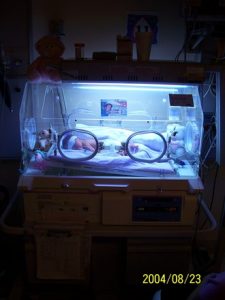Gaining a better understanding of pre-term infant brain injury can help reduce future incidents and improve outcomes for preemies. That’s why researchers at Boston Children’s Hospital, Harvard Medical School and NFANT Labs (an Atlanta-based company) are teaming up. The trio announced they would be collaborating to delve into the question of how neonatal sucking patterns could be an indication of brain development. If abnormal feeding patterns are proven to be an early indicator of an underlying brain injury, then doctors, nurses and other caregivers could take note – and quicker action to address it, ultimately improving outcomes.
Detecting a newborn brain injury early on is difficult. The current brain injury technology we have developed isn’t sensitive enough to pick up potential issues for babies that young. Even equipment that could work tends to be far too expensive for practical use on a regular basis. Prior research has established some type of connection between the way a baby sucks early on and later neurodevelopmental outcomes. A better understanding of this could help doctors detect brain abnormalities faster, which can mean initiating a number of early interventions.
Every year, some 500,000 infants in the U.S. are born premature. Of those, 60,000 babies are born weighing less than 3.3 pounds. Unlike in decades past, most of these babies will survive. However, preventing brain damage in these infants is often a challenge. So while these children are living, the rates of developmental disabilities and cerebral palsy stemming from brain injury are on the rise.
It’s estimated that more than 50 percent or more of very low birth weight pre-term infants will be diagnosed with some sort of neonatal brain injury. Part of the problem is that the cerebral cortex grows rapidly during those last three months of gestation. The earlier an infant is born, the less chance its brain has had to develop.
One of the most common birth injuries that we see in premature newborn babies is a lack of oxygen in the days and weeks after birth. The earlier in gestation a baby is when born, the higher the risk. Some outcomes of infant brain injury include:
- Cerebral palsy.
- Cognitive impairment.
- Speech and language delay.
- Sensory dysfunction.
Each of these can have an impact on long-term physical health, resulting in a higher risk of disease.
Still, we know that medical professionals have a duty during pregnancy and immediately after birth to follow certain standards of care, particularly when they know or should know a mother or child is at risk. For example, failure to detect and promptly treat certain signs of fetal or maternal distress can result in premature birth, when otherwise it could have been avoided. A failure to do this resulting in infant brain injury can be grounds for a medical malpractice lawsuit. An infant who suffers brain injury can incur astronomical medical bills, in addition to other lifelong costs.
Not every instance of brain injury in a premature infant will be cause for legal action, but it’s important to be aware that if your baby has suffered some type of brain injury shortly after birth, you should avail yourself of legal advice.
If you have suffered personal injury in Massachusetts, call Jeffrey Glassman Injury Lawyers for a free and confidential appointment — (617) 777-7777.
Additional Resources:
Boston Children’s Hospital, Harvard Medical School and NFANT Labs Partner to Help Infants with Neonatal Brain Injury, Feb. 7, 2017, NFANT Labs
More Blog Entries:
Report: Special Needs Child Suffers Head Injury, Jan. 7, 2017, Boston Brain Injury Lawyer Blog
 Boston Personal Injury Attorney Blog
Boston Personal Injury Attorney Blog

